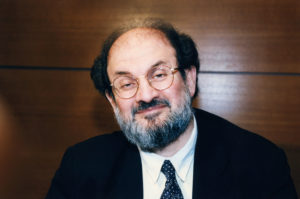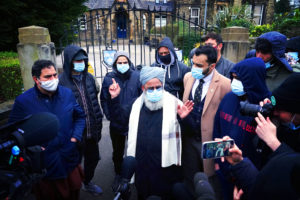For John Milton, death was not the end of his troubles. He spent his final years blind and disgraced, in continual fear of execution by the state. As a fervent republican who had written tracts defending regicide, the restoration of the monarchy in 1660 left his legacy in a precarious position. Denied a place in Poets’ Corner in Westminster Abbey, he was instead interred in the humbler environs of St. Giles Cripplegate. Then, to make matters worse, a little over a century later his corpse was exhumed and mutilated.
Likely inspired by the anti-republican wave that followed the French Revolution, Milton’s resurrectionists tore away pieces of his jawbone, his teeth, and his remaining locks of hair, possibly selling them on as souvenirs. The poet William Cowper was so outraged that he wrote “Stanzas on the late indecent liberties taken with the remains of the great Milton”. To say that these vandals were “taking liberties” is something of an understatement.
St Giles Cripplegate is a small gothic church, one of the few medieval churches lucky enough to survive both the Great Fire of London and the Blitz. It is located at the heart of the Barbican, whose charmless brutalist architecture makes for quite the incongruous backdrop. Few people visit the church today, even though John Bunyan was a parishioner, Oliver Cromwell was married here, and Shakespeare lived just around the corner. It is one of the city’s many overlooked gems.
When I was teaching English Literature at the City of London School for Girls, one of the key texts was Milton’s Paradise Lost (1667). Given its author was buried less than 30 metres from my classroom, I would take my students to the church as part of their course. They would be able to see the nondescript plaque on the floor by the altar which simply reads: “Near this spot was buried John Milton author of Paradise Lost born 1608 — died 1674”. This is quite the contrast to the elaborate marble memorial in Westminster Abbey erected in 1737, with a likeness of the poet sculpted by John Michael Rysbrack.
That the author of the most significant epic poem in the English language should have been condemned to such an ignominious end is a reminder that the fate of heretics is rarely pleasant. Milton was a free-thinker whose worldview was grounded in reason. At a time when the divine right of kings was rarely contested, Milton considered it unreasonable that a man should be king on the basis of an accident of birth. He believed in meritocracy, which is partly what drew him to Cromwell.
Milton had his inconsistencies. He was a profoundly religious man, but nonetheless wrote extensively about the right to divorce. Most remarkably, his puritanical strain was at odds with his eschewal of the Calvinist notion of predestination. For Milton, free will was an essential aspect of our humanity. The fall of man depicted in Paradise Lost is meaningless unless Adam and Eve have chosen freely to partake of the forbidden fruit.
But Milton’s commitment to individual liberty is most keenly expressed in his Areopagitica (1644), a counterblast to the Licensing Order of June 1643, which decreed that all printed texts be passed before a censor in advance of publication. Often cited as a defence of press freedom, the text carries resonance for us at a time when liberalism and free speech is increasingly under threat. Rarely has the case been made with greater elegance and clarity. “Give me the liberty,” he writes, “to know, to utter, and to argue freely according to conscience, above all liberties”.
Of course, Milton’s conceptualisation of “liberty” differs significantly from ours. His was a specifically Christian notion of liberty, predicated on this idea of virtuous self-regulation. He was at pains to distinguish between what he called “licence”, the freedom to do whatever one desires, and “liberty”, by which the faithful man is called to purge those passions and temptations that enslave the soul. “Licence”, Milton contends, is no freedom at all, but an indulgence that amounts to a form of self-imposed tyranny.
Amid all this, Milton is adamant that we are not the merest marionettes, guided by divine providence, but individual agents with responsibility and choice. The act of censorship, he argues, deprives us of our right to determine for ourselves how best to conduct our lives. He makes the case that censorship might begin with good intentions, but that subjective judgement will always blur the line between the heretical and the distasteful. As he puts it in Areopagitica, censors do not “stay in matters heretical” but “any subject that is not to their palate”.
We see evidence of this in today’s “hate speech” laws, which vary markedly from country to country. In 2012, the European Court of Human Rights concluded that there “is no universally accepted definition of the expression ‘hate speech’” and a manual published by Unesco in 2015 accepted that “the possibility of reaching a universally shared definition seems unlikely”. With the concept of “hate” remaining forever nebulous, how can any government possibly hope to legislate against it?
Last week, the Irish government passed the Incitement to Violence or Hatred and Hate Offences Bill, with the minister for justice Helen McEntee uttering the usual shibboleth that “hate speech is not about free speech”. The Government claims that the Bill will “protect genuine freedom of expression”, a justification reminiscent of Scotland’s former justice secretary Humza Yousaf, who asserted that the SNP’s recent Hate Crime and Public Order Bill “does not undermine free speech”, but rather “protects it”. It’s anyone’s guess how a Bill that could see those guilty of “insulting” behaviour imprisoned for seven years, and criminalises statements uttered in the privacy of citizens’ own homes, could in any way be considered a “protection” of civil liberties.
Those responsible for such misguided legislation ought to read their Milton. Their intentions may be compassionate, but the dangers of limiting the scope of individual conscience ought to be clear by now. In any case, isn’t hate an inevitable human feeling, and should law enforcement agencies really be attempting to audit our emotions? And what if the person making the decision about what constitutes “hate” is wrong? As Juvenal has it, quis custodiet ipsos custodes?
History does not look fondly on the hubris of those who appoint themselves as arbiters of permissible speech and thought; their authority is only ever contingent on the wisdom of their time. “How shall the licencers themselves be confided in,” writes Milton, “unless we can confer upon them, or they assume to themselves above all others in the land, the grace of infallibility and uncorruptedness?” John Stuart Mill made a similar point in On Liberty (1859). “All silencing of discussion,” he wrote, “is an assumption of infallibility”.
Milton reminds us to retain our trust in humanity’s capacity for reason. We have convinced ourselves that we exist in an age of “fake news”, but the concept is hardly unprecedented. Milton saw the struggle between Truth and Falsehood as perpetual, and envisaged them as antagonists on a battlefield. “Let her and Falsehood grapple; who ever knew Truth put to the worse, in a free and open encounter?” It isn’t so much that “fake news” is unique to the digital age, but rather that we appear to have lost our faith in our ability to make the stronger case.
It is Milton’s contention that we are far better placed to know and overcome evil if we are acquainted with its essence, and censorship deprives us of this opportunity. Censorship, he maintains, is tantamount to a repudiation of the human spirit. This is why he reserves particular scorn for the destruction of books. We have learnt to laugh off the antics of activists who burn copies of J.K. Rowling’s novels and post the footage online, but, to Milton, this is akin to a form of homicide, “whereof the execution ends not in the slaying of an elemental life, but strikes at that ethereal and fifth essence, the breath of reason itself”. The man who burns a book, he tells us, “slays an immortality rather than a life”.
And yet, Milton leaves himself wide open to accusations of hypocrisy. Areopagitica is a polemic against licensers and the way in which they stymie the possibility of individual choice, but he was to become a censor for the Commonwealth five years after its publication. He was an elitist whose emphasis on liberty certainly did not extend to Catholics. His final written work, the polemical tract Of True Religion (1673), railed against the “growth of popery” and exhorted the public to “beware the growth of this Romish weed”.
While this may strike us inconsistent, to Milton it was the logical progression of his principles. Milton perceived the Catholic Church to be a weapon against freedom, a belief that was surely consolidated by his tour of Europe in the late 1630s. Milton claimed to have met the ageing Galileo in Florence, who at the time was under house arrest by the Inquisition; he had fallen foul of the “hate speech” laws of the Holy See.
I recently spoke on Milton at Gonville and Caius College in Cambridge, where only the week before protesters had attempted to silence the journalist Helen Joyce. The master of the college had hardly helped matters, by emailing all students and staff in advance to smear her work as “offensive, insulting and hateful”. This seems very much at odds with the college’s statement on freedom of speech: “An active speaker programme is fundamental to the academic and other activities of the College and Fellows, staff and students are encouraged to invite a wide range of speakers and to engage critically but courteously with them.”
Of course, disparities between an institution’s official statements and its actual behaviour are nothing new, particularly when there has been a degree of ideological capture. Nonetheless, there is cause for optimism. The treatment of Helen Joyce has backfired, with a number of influential college alumni now considering withdrawing donations. Professor Arif Ahmed, who organised the talks by Helen Joyce and myself, has no intention of surrendering to pressure from above. And next week, the Cambridge Union will be hosting UnHerd‘s Kathleen Stock, whose gender-critical views saw her subjected to a campaign of harassment at Sussex.
For all these little victories, culture warriors will no doubt persist in their efforts to see the Overton Window narrowed to the dimensions of a porthole. This is why the sentiments of Milton strike us as more potent than ever. His defence of free speech will always retain its power where the free exchange of ideas is assailed by increasingly shrill demands to conform.
Disclaimer
Some of the posts we share are controversial and we do not necessarily agree with them in the whole extend. Sometimes we agree with the content or part of it but we do not agree with the narration or language. Nevertheless we find them somehow interesting, valuable and/or informative or we share them, because we strongly believe in freedom of speech, free press and journalism. We strongly encourage you to have a critical approach to all the content, do your own research and analysis to build your own opinion.
We would be glad to have your feedback.
Source: UnHerd Read the original article here: https://unherd.com/




